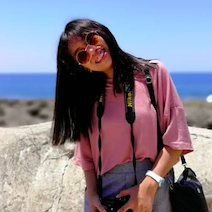

I was born in one of the quiet districts of Zamboanga, a peninsula of different people with different ideologies. It was like a common ground for a variety of religions—Catholicism, Islam, Protestantism, and many others. There were occasional conflicts that would surface among them, but they were inevitable and infrequent.
Although I was born in such an open place, I was raised by a family of Catholics, and they were very religious. Anything that contradicted what was written in the Bible would be considered immoral. There was an unspoken rule in the family that everybody should latch on to God for salvation and fortune, and as such, my whole life revolved around this influence. I used to accompany my mother to church every Sunday, took my first communion at a local church, and had valued a divine figure more than my own emotions.
I joined a church organization when I was 15, encouraged by my peers who were also devoted Christians. We would huddle together after school with fellow churchmates and share our deep thoughts about the Bible and God in general. During Sundays we would go to church and assist the pastors in preparing for the upcoming mass.
This went well for a while, until we found out that one of our peers was secretly engaging in a same-sex relationship with another member of the church. Our organization's leader was clearly against it; she even invaded their private lives, asking them to stop whatever they had and have themselves "fixed" immediately.
That was my epiphany.
I started asking questions. The leader told us that the relationship contradicted the Bible. A man is for a woman, a woman is for a man – it’s not rocket science, she claimed. And as she preached how God forbade these types of human connections, it became clear to me how the Almighty invalidated His people’s emotions. It did not make sense for me that a loving God could also be responsible for this suppression. Day by day, I opened my eyes and slowly saw the imperfections in the Bible, in the deity Himself. There were many, and these fueled my transition into agnosticism even more.
So much happened in the following years. The loss of my father threw me into months of depression. It was not only Papa that I lost on that particular night, but an irretrievable part of myself as well. I also had problems with my grades at school, and this gave me anxiety attacks and depressive episodes worse than before.
I was already seeing a professional counselor at that point, but I was still close to the friends I had back in the organization. (I left years ago, uncomfortable with devoting my efforts to someone whose existence was still debatable.) They told me my depression was fine, that it happens. God had a reason for everything, and my depression would vanish if I'd only go back to church. I gave it a try, and as expected, the attempt went down the drain.
I left the organization once again, knowing that it wasn’t the appropriate type of comfort that I was looking for. By this time, I was already certain that I did not believe in God, nor believe there was someone high up in the skies looking down on me and making sure of my welfare. I became fond of thinking that humans weren’t even significant, and that our existence was not something that would last forever. Eventually, we would go extinct, and the universe would keep shining on long after we did. I fancied nihilism, thinking that it was the only ideology that mattered.
It wasn’t.
My mother moved to Cebu a year later with her newfound partner. I tagged along and finished my final year of senior high school in the city. Cebu was the start of something new and refreshing for me; I could finally perceive the world with neutrality.
Currently, I am narrating this essay as an accounting student in Manila, and the experiences I had in my past would forever shape me as an individual. My departure from Christianity does not mean that I will cling to the arms of blasphemy. Atheism should only be defined as the absence of a divine belief.
While some aspects of nihilism could still ring true, we can still go on holidays, fall in love, fulfill our dreams, and even think of our impending death while remaining optimistic about it. This is what I’ve always admired in Catholics or in religious people in general: How they stay faithful despite such uncertainty.
There is good in each one of us, no matter our different beliefs. I have learned to accept that people are not beholden to my opinions. They are entitled to their own opinions and can do whatever they want, as long as it does not impose on others' freedom. – Rappler.com
Nicole Rebollos is an accounting student fulfilling her dreams at National University. A native of Zamboanga City, she prides herself in speaking 5 different languages, and loves literature and cats.